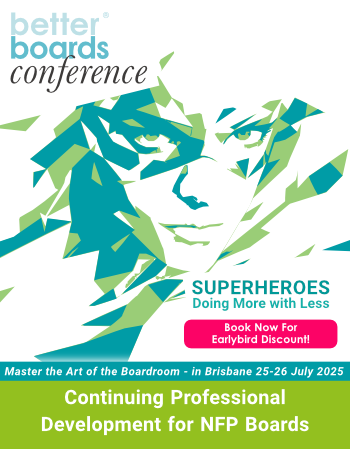performance-metrics
Critical Success Factors for Social Enterprises
Published: September 7, 2015
Read Time: 5 minutes

We asked Michael Dawson, CEO of CBB the not4profit people about what advice he had for organisations in the early stages of starting up. He shared with us his seven critical success factors for start-up social enterprises. This article is extracted from a longer interview conducted with Michael for the podcast SproutCast.
1. Put your mission first
“The first of our critical success factors is to have a very strong focus on mission… We need to have a focus, a clear articulation of our purpose and in Simon Sinek’s language: our “why”. That can really serve to enkindle a passion – a passion that I think one should not be frightened of throwing out there, of showing that passion and that commitment to what you’re really on about. It’s that which people buy or engage with. I think that’s the most important piece of advice about what to try and get right first. If you can’t get that right first, you’re always going to struggle to articulate that story and describe what it is that really makes you or the organisation kick.”
2. Have a business-like focus
“Take quite a business like focus. I think that’s much more permissible within our sector nowadays than it was 20 years ago. I think in fact it’s respected and in any engagement with business-oriented stakeholders or sponsors or investors they’re going to expect that. You need to be business-like and efficient in one’s language, one’s planning and how you express that.”
3. Develop a people-first culture
“One of the success factors that’s certainly served me very well is to have a people-first culture in the organisation. That starts from the leadership, whether that leadership be the board or the senior management or both. A people-first culture I think has been really strong, a strong success factor in what we’ve done. Maybe I’m a bit biased given that my background is psychology and human resources but I really have an inherent and strong belief in the fact that… we rely on people to put our systems, our marketing, our business processes into place. Most businesses are people-oriented… It seems to me essential that we get the right people to do the right job and that we match those people together.”
4. Recruit a strong leadership team
“A good leadership team… which [includes] your board or management committee or whatever it might be, needs to be a diverse range of people with the right expertise in the areas in which the social enterprise is going to operate… And [it’s important to find] people with the time as well the expertise and the knowledge to contribute because there’s no point in having the highest-powered people if they’re not going to have the time and the passion to commit to this new enterprise.
Obviously financial expertise is vitally important… You need to have people who really are very good at the level of establishment financing and how you record numbers, how you process numbers, how you analyse numbers to think about accurately where you’re going and drive some decision-making.”
5. Get your market research right
“Another factor is to getting one’s market research right. I don’t just mean the generic impression that ‘yes there’s a market there, yes there’s a need, and yes we can work to fulfil that’. I think one needs to drill down a bit further than that and really ask what it is that the market will buy and how much will they actually pay. It’s one thing to have an understanding about what you want to sell and how much you think you’re going to charge for it but you need to understand clearly what the other side is going to pay. You might be making a judgment which is inaccurate.”
6. Don’t limit your vision
“I think it’s really good to have a high horizon or eyes on a big vision… not to limit that vision in terms of the passion or the conceptualisation of where you’re heading. Limitations come to that when you start business planning around: ‘What can I do? How am I going to implement? What steps do I need to do in what order?’… Managing a high horizon, a high-powered vision whilst also looking down at your feet and your toes and where you’re going to step and not losing sight of that strategic vision. “
7. Measure your impact
“The last of the critical success factors, which is really important, I think these days is to have a process of measurement of outcomes and the impact that the enterprise is going to have because you will need that to report back and to justify either further investment or change of direction or continuation in a particular business direction… You need to start measuring from day one, not from year three, for obvious reasons. But it’s something that we put off I think, that we need to come back and start measuring and be clear about what we’re measuring from the very beginning.”
This article is an extract from an interview with Michael Dawson, CEO of CBB the not4profit people, for the podcast SproutCast. On SproutCast we chat with change-makers, social entrepreneurs and innovators, and for purpose leaders about how to create positive impact in society and shape a better world. In each episode you’ll discover actionable tips, tactics, strategies, insights and advice on a wide range of areas including: starting and growing a social enterprise or non-profit organisation, joining a non-profit or for purpose board, improving your leadership skills and much more.
Share this Article
Recommended Reading
Recommended Viewing
Author
-
Past Chief Executive Officer
Community Business Bureau
- About
-
Michael was the CEO of CBB. Michael has a unique set of experience gained in the not for profit, private and government sectors.Passionate about the not-for-profit sector, Michael has always held a strong interest in community services/social enterprise – sitting as a Director or Public Officer on many voluntary Boards of Incorporated Associations/start-up services over many years. Currently Michael serves on a number of boards and committees including SA Council of Social Service (SACOSS), and Legal Services Commission of South Australia.
Found this article useful or informative?
Join 5,000+ not-for-profit & for-purpose directors receiving the latest insights on governance and leadership.
Receive a free e-book on improving your board decisions when you subscribe.
Unsubscribe anytime. We care about your privacy - read our Privacy Policy .







